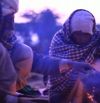
LPP project coordinator, Ilse Koehler-Rollefson, and director of LPP’s Indian organization Lokhit Pashu-Palak Sansthan, Hanwant Singh Rathore, describe efforts to market products such as camel milk and paper made from camel dung.
View film on YouTube.
